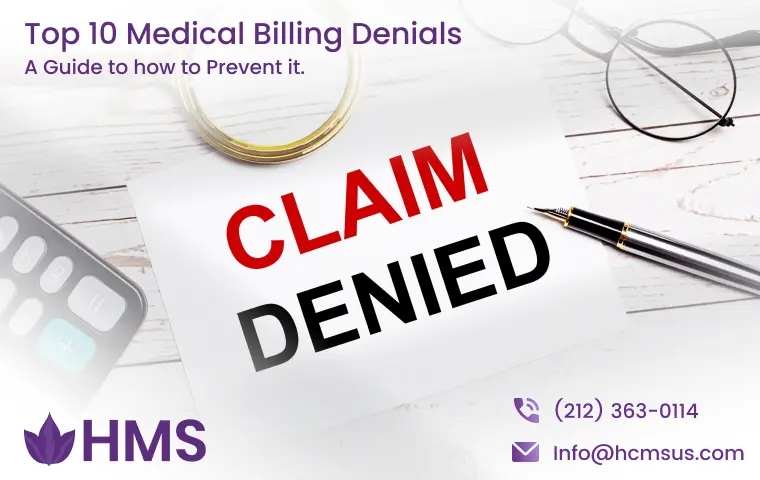Medical billing denials are more than just an inconvenience—they’re a financial headache that can bring your practice to a grinding halt. It’s not just about the immediate impact of a rejected claim; it’s about the ripple effect that damages cash flow, eats up administrative time, and leaves your team scrambling to correct errors.
But what if you could prevent those denials from happening in the first place? The truth is, most denials stem from a handful of common, avoidable mistakes. In this blog, we’re pulling back the curtain on the top 10 reasons your claims are getting denied and—more importantly—how you can fix these issues before they cost you. Let’s dive into the insights that will help your practice thrive.
Common Denials Your Will Face
Now, let’s look into the most common denials that you, as a healthcare provider, are likely to encounter. These denials can disrupt your cash flow and create administrative headaches, but the good news is that they’re often rooted in predictable issues.
1. Duplicate Claim Denials
Scenario:
Imagine submitting a claim for services provided to a patient, only to find out later that it’s been denied because it was marked as a duplicate. You check your records and realize that a slight error caused the same claim to be submitted more than once, resulting in a rejection that stalls your payment.
Denial Code: CO-18 (Duplicate Claim/Service)
Prevention:
To avoid duplicate claim denials, ensure that your billing team is meticulously tracking claims before submission. Implement a thorough review process to catch any duplicates and use claim management software that flags potential repeat submissions before they reach the payer.
2. Coordination of Benefits (COB) Denials
Scenario:
You submit a claim for services rendered, but it comes back denied because the payer determines they are not the primary insurance responsible for the charges. After investigation, you find out the patient has multiple insurances, and the claim was mistakenly submitted to the wrong insurer first.
Denial Code: CO-22 (Coordination of Benefits)
Prevention:
To prevent COB denials, always verify the patient's insurance coverage and determine the correct primary and secondary insurers before submitting a claim. Maintain accurate and up-to-date records of the patient's insurance information, and ensure that all COB requirements are met, such as providing details on other payers. This will help avoid confusion and ensure timely payment from the correct insurer.
3. Non-Covered Services Denial
Scenario:
A claim is submitted for a routine medical service, but it gets denied because the service isn’t covered under the patient’s insurance plan. Upon review, you discover that the service provided falls outside the scope of the patient’s benefits, resulting in a non-covered services denial.
Denial Code: CO-96 (Non-Covered Charge(s))
Prevention:
To prevent non-covered services denials, always verify the patient’s benefits and coverage details before rendering services. Ensure that the treatments or procedures planned are covered under their insurance policy, and if a service is not covered, inform the patient upfront and consider alternative solutions, or arrange for self-pay if applicable. This proactive approach reduces the risk of claim rejections and financial surprises for patients.
4. Missed Deadline Denial
Scenario:
You provide a service, but the claim is denied because it wasn’t submitted within the required time frame set by the payer. Upon investigation, you realize that the deadline for claim submission had passed, leading to an automatic denial.
Denial Code: CO-29 (The time limit for filing has expired)
Prevention:
To avoid missed deadline denials, establish a strict internal process for submitting claims promptly after services are provided. Regularly monitor claim submission deadlines for different payers, as they can vary. Implement automated reminders or claim tracking software to ensure claims are submitted within the appropriate time frame and avoid costly delays in reimbursement.
5. Charge Exceeds Fee Schedule Denial
Scenario:
A claim is submitted, but it comes back denied because the amount billed exceeds the allowable charge under the payer's fee schedule. In this case, the payer adjusts the claim and reimburses only up to their allowed limit, while the remainder is denied as an excessive charge.
Denial Code: CO-45 (Charge exceeds fee schedule/maximum allowable amount)
Prevention:
To prevent CO-45 denials, ensure that your billing team is familiar with the fee schedules and allowable amounts for each payer. Before submitting a claim, double-check that the charges align with the contracted rates agreed upon with the insurance company. Staying up-to-date with each payer’s fee schedule can help reduce the risk of underpayment or denials due to excessive charges
6. Claim Not Covered by This Payer Denial
Scenario:
You submit a claim, but it is denied with the explanation that the claim is not covered by the payer. After reviewing the details, you find out the claim was submitted to the wrong insurance payer or the patient's insurance had changed, and this payer is not responsible for the claim.
Denial Code: CO-109 (Claim not covered by this payer/contractor, you must send the claim to the correct payer)
Prevention:
To prevent CO-109 denials, always verify the patient’s insurance information at the time of service and confirm which payer is responsible for the claim. Ensure that claims are submitted to the correct insurance company, especially if the patient has recently switched coverage. Implementing thorough insurance verification procedures can help avoid this type of denial and ensure that claims reach the appropriate payer from the start.
7. Precertification/Authorization Required Denial
Scenario:
A claim is submitted for a procedure, but it gets denied because the necessary preauthorization or precertification wasn’t obtained before the service was rendered. Without the payer’s prior approval, the claim is automatically rejected.
Denial Code: CO-197 (Precertification/authorization/notification absent)
Prevention:
To avoid CO-197 denials, make sure that your billing team obtains the required precertifications or authorizations from the payer before providing services. Always verify whether a specific procedure or treatment requires prior approval from the insurance provider. Establish a system to track authorization requests and ensure they are obtained in a timely manner to prevent claim rejections.
8. An Attachment/Required Documentation is Missing Denial
Scenario:
A claim is submitted for services, but it’s denied because important documentation or attachments, such as medical records, lab results, or other supporting documents, were not included with the claim. Without these, the payer is unable to process the claim, resulting in a denial.
Denial Code: CO-252 (An attachment/other documentation is required to adjudicate this claim/service)
Prevention:
To prevent CO-252 denials, ensure that all necessary documentation is attached when submitting the claim. This includes any medical records, authorization forms, or reports required by the payer. Implement a review process where claims are checked for completeness, including all supporting documents, before submission. This will help ensure claims are processed smoothly and on time.
9. Sequestration Adjustment Denial
Scenario:
You submit a claim, and it’s partially denied due to the federal government’s sequestration policy, which reduces the reimbursement amount by a set percentage. Although the service is covered, the payer applies a mandatory reduction as part of the budget control.
Denial Code: CO-253 (Sequestration – reduction in federal reimbursement)
Prevention:
Unfortunately, CO-253 denials cannot be fully prevented, as sequestration is a mandated reduction in federal reimbursements. However, you can prepare for this by understanding the specific percentage reduction that applies to your Medicare claims (currently 2%) and adjusting your financial expectations accordingly. Ensure your billing team is aware of this policy and educates the practice on how sequestration impacts overall reimbursements.
10. Benefit Coverage Not Available Denial
Scenario:
A claim is submitted for a service, but it is denied because the patient's benefits do not cover the particular service or procedure. After further review, you realize that the service is excluded from the patient's insurance plan, leading to the denial.
Prevention:
To avoid CO-97 denials, verify the patient's insurance benefits and coverage details before providing the service. Check if the service is covered under the patient's plan and whether it's considered part of a bundled payment for another procedure. This helps to avoid providing non-covered services or submitting claims for services that are bundled with other procedures, ensuring smooth reimbursement and minimizing the risk of denied claims.
Words By Author
By taking proactive steps to prevent these denials—whether it’s verifying insurance details, obtaining preauthorizations, or submitting claims within deadlines—you can streamline your billing process and reduce the frustration of rejected claims. Denials don’t have to be inevitable roadblocks; with the right strategies in place, you can minimize their impact and ensure smoother, more consistent revenue flow for your healthcare practice. Stay informed, stay diligent, and turn these common denials into opportunities for improvement.
ABOUT AUTHOR

John Whick
As a blog writer with years of experience in the healthcare industry, I have got what it takes to write well-researched content that adds value for the audience. I am a curious individual by nature, driven by passion and I translate that into my writings. I aspire to be among the leading content writers in the world.
